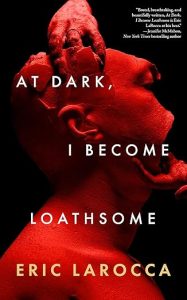
Eric LaRocca
Blackstone Publishing (January 28, 2025)
Reviewed by Andrew Byers
Eric LaRocca is a writer of transgressive horror. His work shocks, it pushes boundaries, it strives to make the reader uncomfortable. It sometimes deals with gruesome topics, not shying away from using graphic violence and deeply personal subject matter to reveal truths about the human condition. That description of LaRocca’s body of work holds true for At Dark, I Become Loathsome, which is a haunting and visceral exploration of identity, guilt, and the body, all wrapped in the author’s signature blend of horror and emotional rawness. LaRocca continues to solidify his position as a bold voice in contemporary queer horror, and as a boundary-pushing author unafraid to delve into the darkest corners of human experience. While At Dark, I Become Loathsome is undoubtedly disturbing, it is also deeply poetic, offering readers a narrative that is as thought-provoking as it is unsettling.
This is the story of Ashley Lutin, a man whose wife has died and whose son disappeared years ago. His life is one of aimless grief. He now runs a service in which he helps profoundly troubled people find a new lease on life by undergoing a harrowing ritual of Ashley’s own design. This begins as an act of mercy for lost, despairing souls. It turns into something radically different, as Ashley’s motivations for helping people, and his own fragile psychological state, begin to deteriorate.
LaRocca is known for his transgressive horror, and that is true here. It is not transgressive in the sense of extreme gore or explicit acts, but rather in terms of shattered trust and the frankness with which it addresses a topic like child abduction. The novel turns on several acts of depravity: one, that takes place long before the start of the novel, and one that happens mid-book. Nothing is the same after either. Throughout the novel, Ashley grapples with his own sense of monstrosity, both physically and psychologically, and yet, despite his actions, he is not the most monstrous individual in the book. Here, LaRocca uses horror as a vehicle for exploring broader themes of self-loathing, alienation, and the struggle to reconcile with one’s own desires and identity.
While I wouldn’t describe this as a body horror novel, the body, in LaRocca’s hands, becomes a canvas for horror and vulnerability, pushing the boundaries of what it means to be human. At its core, the novel is a meditation on the ways in which society enforces certain norms and how deviation from those norms can be met with revulsion or fear. The title itself, At Dark, I Become Loathsome, hints at the theme of hidden selves, those parts of us that come alive in darkness—both literal and metaphorical—when we are away from the gaze of societal judgment. LaRocca asks difficult questions about shame, the fear of rejection, and how external perceptions can shape or distort one’s sense of self-worth.
Yet, LaRocca’s handling of these themes is not heavy-handed. The novel reads like a fever dream, where the lines between reality and nightmare blur, leaving readers in a state of disquiet before depositing them into a pit of shock. Atmosphere is one of the book’s greatest strengths. There are no clear answers or easy resolutions, and that is precisely what makes At Dark, I Become Loathsome such a compelling read. As is typical, LaRocca’s prose is lyrical and evocative here, with a haunting beauty that lingers long after the last page is turned.
In many ways, At Dark, I Become Loathsome feels like a continuation of the themes LaRocca has explored in previous works, such as Things Have Gotten Worse Since We Last Spoke, but here, his craft has evolved. The horror is sharper, more intimate, and more resonant, especially in its exploration of queerness and the body as sites of both power and vulnerability. For readers who appreciate horror that pushes the envelope and forces them to confront uncomfortable truths, At Dark, I Become Loathsome is an essential work.
- Book Review: EXTINCTION DREAM - August 18, 2025
- Book Review: THE SOLSTICE - August 12, 2025
- Book Review: THE SECRET HOUSE - August 8, 2025
- Book Review: RABBIT FACE AND FURTHER AWFUL ENCOUNTERS - August 4, 2025
- Book Review: BOGGANMOR - January 30, 2025
- Advance Review: AT DARK, I BECOME LOATHSOME - October 11, 2024
- Advance Review: A DISTANT SILVER MELODY - October 1, 2024
- Advance Review: ISLAND OF THE DEAD - August 25, 2024
- Book Review: THE ABYSSAL PLAIN - August 23, 2024
- Book Review: BLACK SEAS OF INFINITY - July 24, 2024


